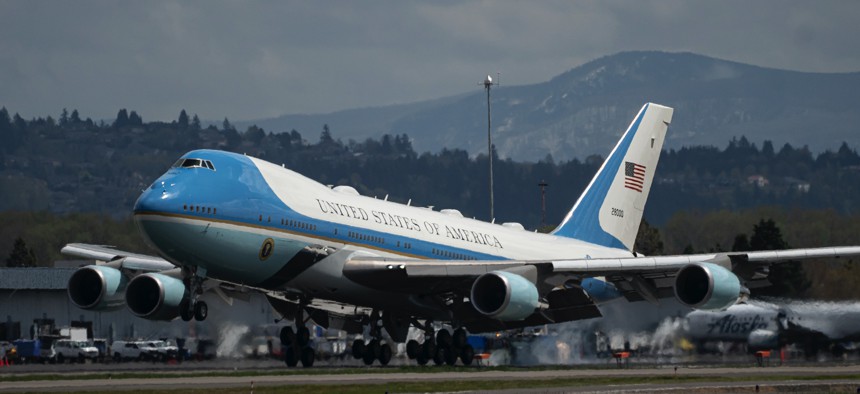
Air Force One, carrying U.S. President Joe Biden, lands at the Portland Air National Guard Base where Biden delivered remarks on infrastructure on April 21, 2022, in Portland, Oregon. Nathan Howard/Getty Images
The New Air Force Ones Are Late, So the Old Planes Need More Cash, Official Says
The Air Force acquisition chief cites a 2- to 3-year delay, which Boeing blames on subcontractor and supply problems.
The U.S. Air Force will need more funding to keep the two Air Force One presidential jets flying at least two to three years longer than planned due to Boeing’s stumbles in building two new replacements.
Andrew Hunter, the Air Force’s top acquisition official, told a House subcommittee Thursday that the service will ask Congress for the extra money next year in its fiscal 2024 spending request. Hunter did not say how much money would be needed.
“We are looking at a two- to three-year delay in the schedule” for the new planes, Hunter told the House Armed Services seapower and projection forces subcommittee. “That means that we will have to sustain the existing aircraft for longer, and we are posturing to do that.”
Boeing has largely blamed the delays in building the two new presidential jets on a subcontractor and supply chain problems stemming from the coronavirus pandemic. In March, the Air Force said in its 2023 budget request that the new planes are unlikely to fly a president until at least 2026.
Boeing has lost $1.1 billion building the new planes, but taxpayers have been insulated from paying for the company’s cost overruns. That’s due to a contract negotiated by former President Trump that requires the company to pay for its overages. Last month, Boeing CEO David Calhoun lamented the deal, saying he company shouldn’t have agreed to Trump’s terms.
Hunter told lawmakers Thursday that the Pentagon doesn’t need more money for the new Air Force One jets, just the older ones.
In 2018, the Air Force scrapped a $24 million effort to replace aging refrigerators on the old Air Force Ones, in part, because of progress building the new planes.
Hunter’s comments came hours after The Air Current reported that Pentagon leaders are among the growing group of people concerned about the future of Boeing. The company, which recently announced plans to move its headquarters from Chicago to suburban Washington, D.C., has lost about $10 billion on defense projects over the past decade. That in large part was driven by a strategy to drastically underbid its competitions during Pentagon competitions.







